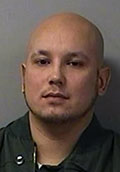
At an evidence hearing today in the murder case proceedings against Richard D. Hanes, his defense attorney argued that Judge Charles Zambito should not allow his client's mobile phone and its content to be presented to a jury if the case goes to trial.
Hanes, 36, is accused of beating to death Raymond Morgan on July 24 at 111 Liberty St. Batavia.
According to court testimony today by Det. Thad Mart, Hanes showed up at the Batavia PD headquarters and presented himself to police for questioning without being summoned there. At the time, he wasn't a suspect and police had yet to obtain DNA, fingerprints or palm prints that linked him to the case.
The interview with Hanes was videotaped and that evidence was also submitted to the court today (though not played in court).
Mart said on the stand that Hanes does not confess to the murder during the interview nor did he implicate himself while at the police station.
It was during the interview at Batavia PD that parole officers who supervised Hanes showed up and the officers took his mobile phone, apparently, in connection with an alleged parole violation. The parole officers then turned the phone over to a Batavia PD patrol officer.
Defense attorney Fred Rarick argued that if the phone was linked to an actual parole violation, parole officers would have kept it as evidence in that case and would not have turned it over to a police officer.
Rarick argued that the police didn't have probable cause to seize the phone and that parole taking the phone and giving it to police is an attempt to circumvent the need for a warrant.
"There is no probable cause because we don't know why he was arrested on a parole violation," Rarick said. "If there was something on his phone relative to his parole, they would have retained possession of that phone."
District Attorney Lawrenece Friedman said there is no evidence that parole and police communicated about the phone prior to the police obtaining it, that there is no evidence of any agreement for the officers to work togther to obtain the phone.
"It's all very speculative," Friedman said. He added later, "It really doesn't matter why a parole officer took the phone because they were not acting as an agent for the police."
He compared it to a private citizen obtaining the phone, walking out with it and then deciding to hand it over to police.
Outside of court Friedman said he couldn't discuss the significance of the phone to the case.
There is reportedly DNA evidence that links Hanes to the crime scene and investigators have said they believe the murder was premeditated.
Zambito said he will reserve his decision on the admissibility of the phone until a later date. Hanes is scheduled for another court appearance at 2:45 p.m., March 13.
